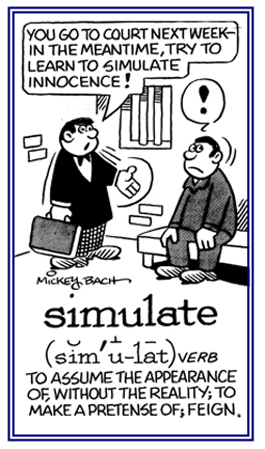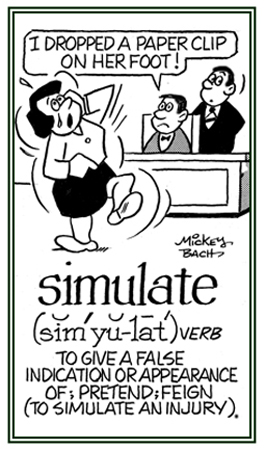simal-, simil-, simul-, -semble
(Latin: same, like, alike; same time; to appear, to seem; together)
1. A representation or image of something.
2. Something which has a vague, tentative, or shadowy resemblance to something else.
2. Something which has a vague, tentative, or shadowy resemblance to something else.
simulate (verb), simulates; simulated, simulating
1. To reproduce the essential features of something; such as, an aid to study or training: To practice for their drivers’ exams, students were using a computer to simulate various driving conditions and situations.
2. To feign, fake, or to pretend to experience something: Margie simulates pleasure even when someone disturbs her.
3. To mimic or to imitate someone or something: There are some homeowners who use devices that simulate the sounds of barking dogs in order to keep intruders away from their houses.
4. To create a representation or a model of a physical system or some particular action: Margaret bought a coat that simulatesthe the look and feel of real fur.

© ALL rights are reserved.

© ALL rights are reserved.
Go to this Word A Day Revisited Index
2. To feign, fake, or to pretend to experience something: Margie simulates pleasure even when someone disturbs her.
3. To mimic or to imitate someone or something: There are some homeowners who use devices that simulate the sounds of barking dogs in order to keep intruders away from their houses.
4. To create a representation or a model of a physical system or some particular action: Margaret bought a coat that simulatesthe the look and feel of real fur.
Tom's neighbor has a wooden wall that simulates the appearance of stone.
5. Etymology: from Latin simulatus, past participle of simulare "to make like, to imitate, to copy" from the stem of similis, "like, resembling, of the same kind".

Go to this Word A Day Revisited Index
so you can see more of Mickey Bach's cartoons.
1. The reproduction of the essential features of something; such as, an aid to study or training.
2. The imitation or feigning of something or a false appearance.
3. The construction of a mathematical model to reproduce the characteristics of a phenomenon, system, or process, often using a computer.
4. A computer game which simulates or reproduces a real activity; such as, flying.
5. A broad collection of methods used to study and to analyze the behavior and performance of actual or theoretical systems.
2. The imitation or feigning of something or a false appearance.
3. The construction of a mathematical model to reproduce the characteristics of a phenomenon, system, or process, often using a computer.
4. A computer game which simulates or reproduces a real activity; such as, flying.
5. A broad collection of methods used to study and to analyze the behavior and performance of actual or theoretical systems.
Simulation studies are performed, not with a real-world system, but on a (usually computer-based) model of the system created for the purpose of studying certain system dynamics and characteristics.
simulative (adjective), more simulative, most simulative
simulatively (adverb), more simulatively, most simulatively
The inability to comprehend more than one part of a visual scene at the same time or to integrate the parts into a whole.
simultaneous (adjective) (not comparable)
simultaneously (adverb) (not comparable)
Ubi non est directa lex, standum est arbitrio judicis, vel procedendum ad similia. (Latin legal statement)
Translated: "Where there is no direct law, the opinion of the judge is to be taken, or references to be made to similar cases."
unassembled (adjective) (not comparable)
verisimilar (adjective), more verisimilar, most verisimilar
Appearing to be true or real.
1. The appearance of being true or real.
2. Something that only appears to be true or real, e.g., a statement that is not supported by evidence.
2. Something that only appears to be true or real, e.g., a statement that is not supported by evidence.

